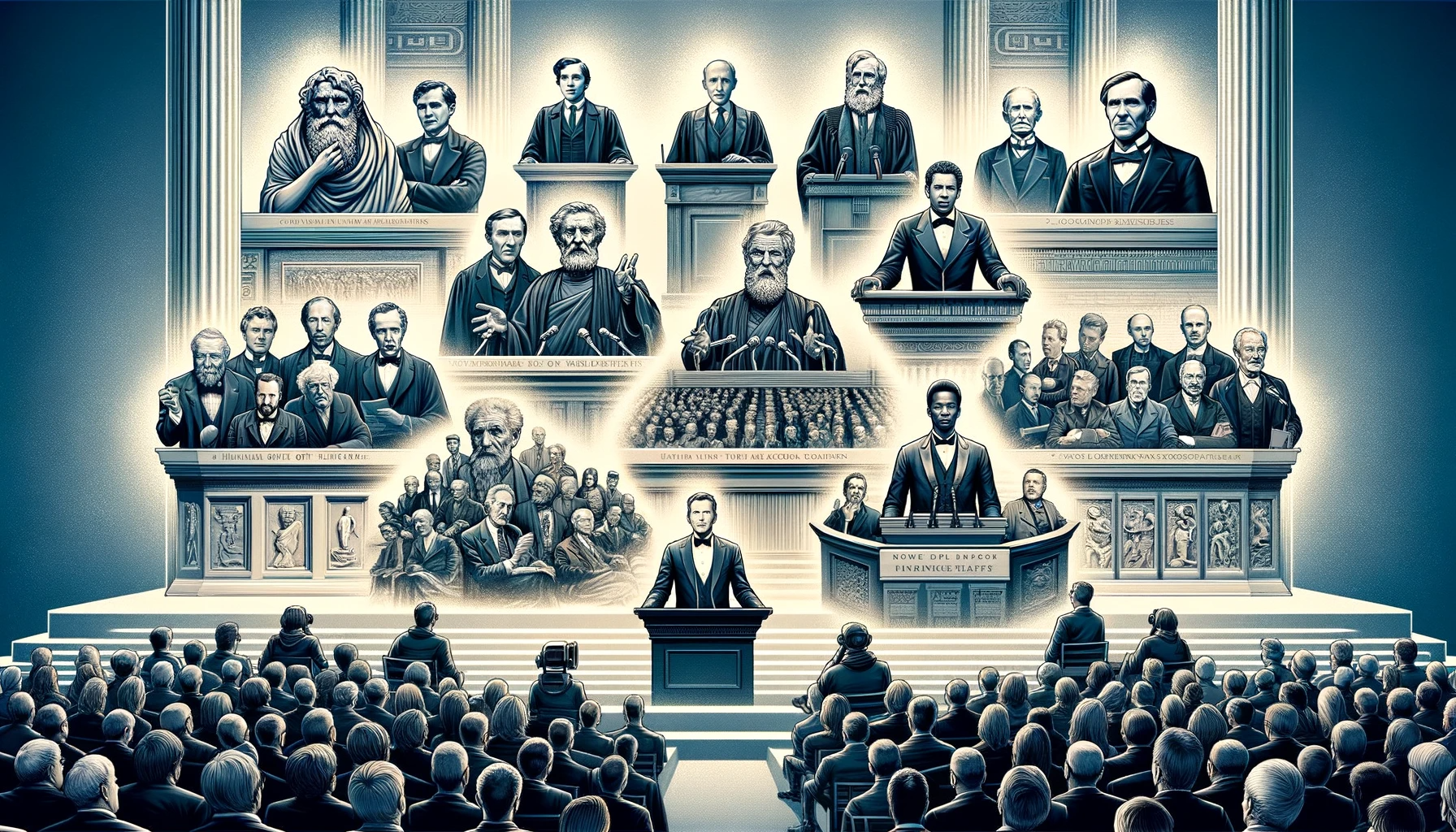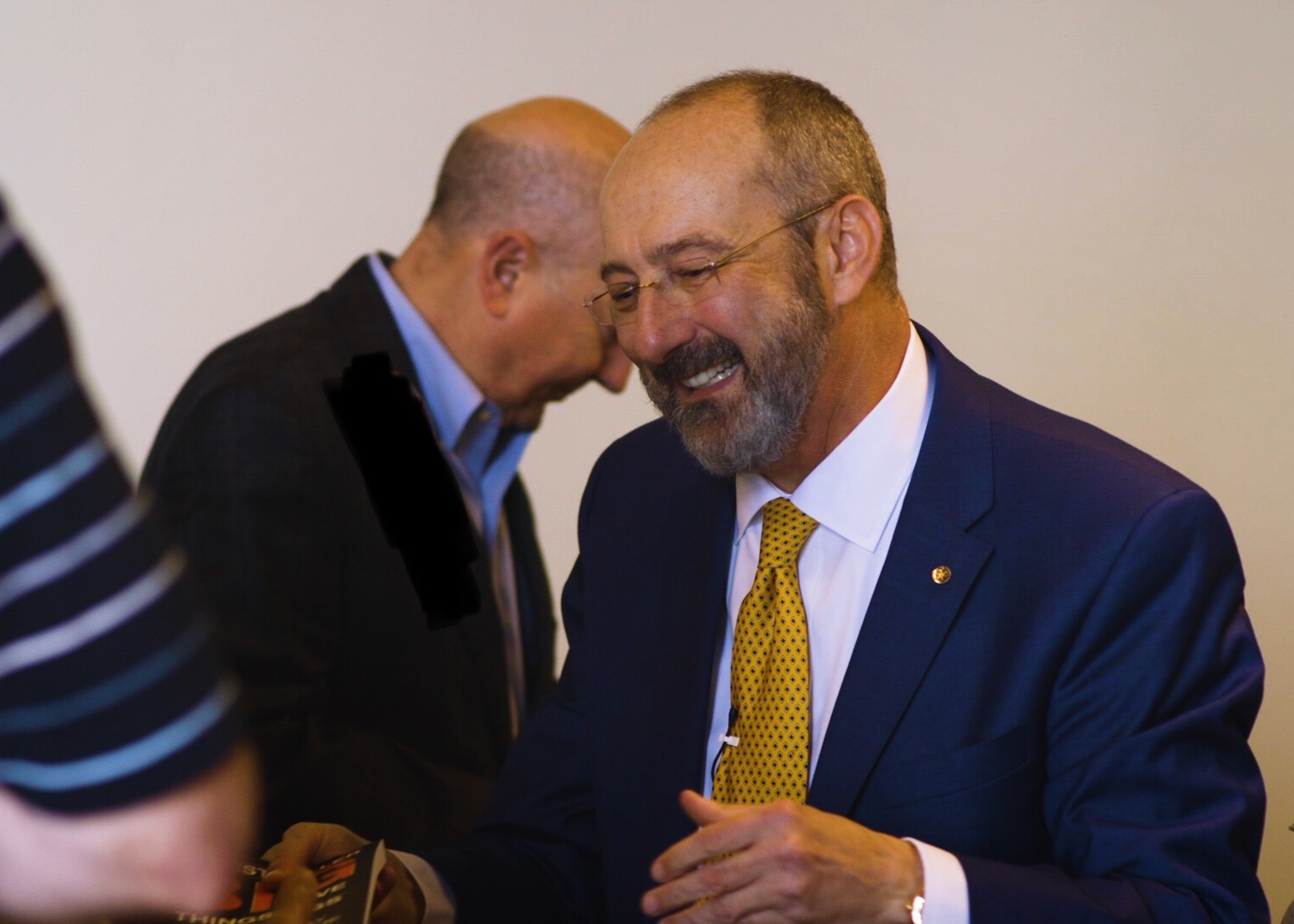When you ask yourself, “What is a keynote speaker?“, imagine being at an event where one person not only captures but also elevates the entire audience’s energy.
This individual, known as the keynote speaker, plays a pivotal role in setting the tone and delivering a message that resonates long after the event concludes.
In this article, we’re going to unravel the mysteries behind keynote speakers.
We’ll look at their roles, the unique traits that make them so influential, and the significant impact they have on events.
Whether you’re an event organizer or simply curious about the art of keynote speaking, you’ve come to the right place.
Let’s begin our exploration into the captivating world of keynote speakers.

Defining a Keynote Speaker: An Introduction
When we think about the heart and soul of a major conference or event, the image that often comes to mind is of a captivating figure on the stage – the keynote speaker.
But what exactly makes a keynote speaker so integral to these events?
Let’s uncover this together.
More Than Just a Speaker
At first glance, a keynote speaker might seem like just another presenter.
However, they are so much more…
Let’s discuss:
- The Tone Setter: They set the overall tone and theme of the event.
- The Big Draw: Often, they are a major draw for attendees, sometimes being well-known personalities or experts in their field.
- The Message Carrier: Their speech is not just about conveying information but inspiring and motivating the audience.
The Art of Keynote Speaking
Keynote speaking is an art form.
It requires a blend of skills and attributes.
Here are 3 things I personally like to focus on when speaking to an audience:
- Storytelling: The ability to weave facts, anecdotes, and messages into a compelling narrative.
- Engagement: They don’t just speak; they engage with the audience, often leaving them with thought-provoking ideas or questions.
- Adaptability: Being able to connect with diverse audiences, tailoring their message to resonate with different groups.
The Impact of Their Words
The impact of a keynote speaker is far-reaching.
Think of it in terms like this…
- They can inspire change, encouraging individuals and organizations to think or act differently.
- Keynote speeches often become the highlight of events, remembered and talked about long afterward.
- They have the power to ignite innovation and spark new ideas among their audience.
Keynote Speakers in Various Fields
Keynote speakers come from a wide variety of backgrounds.
Below are just a few industries you can pull speakers from.
- Business leaders, sharing insights on leadership and management.
- Technology experts, unveiling the latest advancements and future trends.
- Motivational speakers, uplift and encourage personal growth and development.
Are you starting to understand what a keynote speaker is now?
A keynote speaker is more than just a person who stands on a stage and talks.
They are the essence of the event, infusing it with energy, inspiration, and direction.
As we continue to explore the world of keynote speakers in the next sections, we’ll take a deeper look into their roles, traits, and the unforgettable impact they leave behind.

History and Evolution of Keynote Speaking
The art of keynote speaking is not a modern invention.
It’s a craft that has been refined over centuries, influenced by great orators and changing societal needs.
Let’s take a brief journey through the evolution of keynote speaking.
Ancient Roots
The origins of public speaking can be traced back to ancient civilizations.
Greek philosophers like Aristotle and Socrates were early masters of rhetoric, using their oratory skills to educate and influence.
Roman statesmen like Cicero later elevated public speaking into an art form.
Their impact on the art of persuasion and public speaking is still studied today.
The Middle Ages and Renaissance
During the Middle Ages, the art of speaking took a more religious turn, with sermons and religious discourses becoming the primary form of public speaking.
However, the Renaissance reignited interest in classical rhetoric, and scholars began to study and teach the principles of Aristotle and Cicero once again.
The Rise of Keynote Speaking in Modern Times
As we moved into the modern era, the role of the public speaker evolved.
The Industrial Revolution and the rise of large-scale events brought a need for speakers who could captivate and inspire large audiences.
This era saw the rise of the keynote speaker as we know it today – a central figure, who sets the tone for events and conferences.
Today’s Keynote Speaker
Today, keynote speakers are a blend of educators, entertainers, and inspirers.
They are often chosen for their expertise, experiences, and ability to connect with an audience on a deeper level.
The digital age has also expanded keynote speaker’s reach, with speeches being broadcasted globally, transcending physical boundaries.
For a deeper dive into the history of public speaking and its evolution, check out this insightful article from History.com.
The journey of keynote speaking is a testament to the enduring power of the spoken word.
As we continue to explore this fascinating topic, we’ll uncover more about the roles, responsibilities, and lasting impact of keynote speakers.

Roles and Responsibilities of a Keynote Speaker
Understanding the roles and responsibilities of a keynote speaker is crucial to appreciating their impact.
A keynote speaker does much more than just ‘speak.’
Let’s explore the multifaceted nature of this pivotal role.
Inspiring the Audience
A keynote speaker’s primary role is to inspire and motivate their audience.
They bring energy and enthusiasm that can transform an event’s atmosphere, making their speech a memorable experience.
Setting the Event’s Tone
The keynote address often sets the tone for the entire event.
A well-delivered keynote can create a positive mood, establish the event’s theme, and provide a framework for the discussions that follow.
Providing Expertise
Keynote speakers are usually experts in their field.
They share valuable insights and knowledge, offering the audience a unique perspective on relevant topics.
Engaging with the Audience
Effective keynote speakers engage with their audience, creating a two-way dialogue.
They encourage participation, provoke thought, and often leave the audience with impactful takeaways.
To better understand the importance of these roles in successful events, read this insightful piece from Forbes on the importance of great keynote speakers at events.
As we take a closer look into the art and science of keynote speaking, it becomes clear that these speakers are much more than just voices on stage.
They are the catalysts for change, inspiration, and new ideas.
In the next section, we’ll explore the characteristics that make a keynote speaker truly effective and memorable.

Characteristics of an Effective Keynote Speaker
What transforms a good speaker into a great keynote speaker?
It’s a combination of several key characteristics.
Let’s explore these traits that make keynote speakers not just heard, but remembered.
Confidence and Charisma
- Confidence: Great keynote speakers exude confidence. They command the stage with assurance and poise, making their presence felt.
- Charisma: They possess a natural charm and charisma that captivates the audience, making their message more impactful.
Expertise and Knowledge
- Depth of Knowledge: They are often experts in their field, bringing a depth of knowledge that adds credibility to their message.
- Lifelong Learners: Effective keynote speakers are always learning and evolving, keeping up-to-date with the latest in their field.
Ability to Connect with the Audience
- Engagement: They know how to engage with the audience, making each listener feel like they are being spoken to directly.
- Empathy: These speakers can relate to their audience, understanding their needs and addressing them effectively.
Communication Skills
- Clear Messaging: They can convey their message in a clear, concise, and engaging manner.
- Storytelling: Great keynote speakers are also great storytellers. They use stories to illustrate their points and connect on an emotional level.
Adaptability and Flexibility
- Adapting to the Audience: They can tailor their message to resonate with different audiences.
- Handling the Unexpected: A skilled keynote speaker can handle unexpected situations or questions with ease and grace.
These characteristics combine to create a speaker who doesn’t just deliver a speech but creates an experience.
For more insights into what makes a keynote speaker stand out, check out this article from Psychology Today.
In the next sections, we’ll explore the impact these speakers have on events and how to choose the right one for your needs.
Stay tuned to uncover more about the incredible world of keynote speaking.

The Impact of a Keynote Speaker on Events
Throughout this article, we’ve explored what a keynote speaker is, their history, roles, and the characteristics that make them effective.
Now, let’s dive into the profound impact these speakers have on events and their audiences.
Setting the Event’s Atmosphere
- A keynote speaker often sets the tone for the entire event. Their energy, enthusiasm, and message lay the groundwork for what attendees can expect.
- As we discussed in the ‘Roles and Responsibilities’ section, the right speaker can transform the mood and feel of an event.
Inspiring Change and Action
- One of the most significant impacts of a keynote speaker is their ability to inspire change and action in their audience.
- As highlighted in the ‘Characteristics of an Effective Keynote Speaker’ section, their expertise and persuasive communication skills can motivate attendees to think and act differently.
Facilitating Networking and Discussions
- A compelling keynote speech can be a conversation starter, sparking discussions and networking among attendees.
- This aspect ties back to the importance of engaging with the audience, a trait we emphasized earlier.
Educating and Informing
- Keynote speakers often provide valuable insights and information, contributing to the educational aspect of the event.
- Their depth of knowledge, a characteristic we’ve previously discussed, helps in enlightening the audience on specific topics.
Leaving a Lasting Impression
- The message and delivery of a great keynote speaker often leave a lasting impression on the attendees, long after the event is over.
- This lasting impact is a culmination of the various roles and characteristics we’ve explored in the previous sections.
The impact of a keynote speaker extends beyond the confines of the event.
They ignite ideas, inspire change, and leave a lasting imprint on their audience’s minds.
To understand more about the influence of keynote speakers on events, consider reading this insightful article from TED Talks, a platform known for its powerful keynote presentations.
As we move towards the conclusion of our exploration into the world of keynote speakers, we’ll next look at how to choose the right keynote speaker for your event, tying together all the aspects we’ve discussed thus far.

How to Choose the Right Keynote Speaker for Your Event
Choosing the right keynote speaker is crucial for the success of your event. As we’ve seen in previous sections, a keynote speaker sets the tone, inspires change, and leaves a lasting impact.
Here’s a guide to help you select the perfect speaker for your event.
Understand Your Event’s Objective and Audience
- Identify the main goal of your event and the type of audience attending. This will guide you in finding a speaker whose message aligns with your objectives.
- Consider the demographic and interests of your audience to ensure the speaker can connect with them effectively.
Look for Expertise and Credibility
- Choose a speaker who is an expert in the field relevant to your event’s theme, as discussed in the ‘Roles and Responsibilities’ section.
- Check their credibility through past speaking engagements, publications, and audience feedback.
Evaluate Their Speaking Style and Ability to Engage
- Every speaker has a unique style. Watch videos of their past speeches to gauge if their style fits your event.
- As highlighted in the ‘Characteristics of an Effective Keynote Speaker’ section, their ability to engage and inspire the audience is crucial.
Consider Their Impact on Previous Events
- Research the impact they have had on previous events. Did they inspire change or spark new ideas?
- Feedback from previous event organizers can provide valuable insights into their effectiveness.
Ensure Logistical Compatibility
- Confirm their availability for your event dates and consider any logistical requirements like travel and accommodation.
- Discuss and agree on the fee and any additional expenses upfront to avoid surprises.
Selecting the right keynote speaker can elevate your event from good to unforgettable.
By considering these factors, you can find a speaker who not only delivers a great speech but also resonates with your audience and enhances the overall experience of your event.
For more detailed guidance on selecting keynote speakers, this article from Harvard Business Review offers great insights.
Having explored the various facets of keynote speakers, from their roles to their selection, we’re now ready to wrap up our journey with a conclusion that ties together all these insights.

Conclusion: The Unforgettable Impact of a Keynote Speaker
As we reach the end of our exploration into the world of keynote speakers, it’s clear that their influence extends far beyond the stage.
From the ancient roots of public speaking to the dynamic presence of today’s keynote speakers, their role in shaping events and inspiring audiences is undeniable.
We’ve discovered that a keynote speaker is much more than just a figure delivering a speech.
They are the tone-setters, the inspirers, and the catalysts for change.
Their unique blend of confidence, charisma, and expertise empowers them to connect deeply with their audience, leaving a lasting impression that resonates well beyond the event itself.
Choosing the right keynote speaker, as we’ve outlined, is a critical decision.
It involves understanding your audience, recognizing the speaker’s ability to engage and inspire, and ensuring their message aligns with your event’s goals.
The right speaker can transform an ordinary event into an extraordinary experience, igniting minds and sparking innovation.
As you reflect on the insights shared in this article, remember that the power of a keynote speaker lies in their ability to weave stories, share wisdom, and inspire action.
Whether you’re organizing an event or simply attending one, the presence of a skilled keynote speaker can make all the difference, turning an event into a memorable journey of inspiration and learning.
Hopefully, this guide is useful for helping you choose your next keynote speaker!

